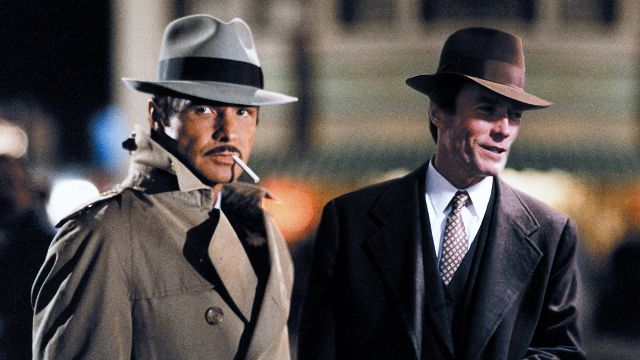City Heat (1984) 
“Take Clint the street-smart cop . . . take Burt the wise-guy private eye . . . and then take cover!”

Director: Richard Benjamin
Cast: Clint Eastwood, Burt Reynolds, Jane Alexander
Synopsis: A slick private eye and tough police lieutenant–once partners, now bitter enemies–reluctantly team up to investigate a murder.
Teaming the world’s two highest-ranking movie stars of the late 1970s and early 80s must have seemed like a guaranteed money-maker to the Hollywood money men back in 1984. Everybody loved cheeky, twinkle-eyed Burt and everyone admired the granite-jawed integrity of Clint Eastwood. How could it fail? Well, for a start, the two disparate styles of these leading men are so far removed from one another that they never for a moment stand any chance of gelling. Add to this the early departure of Blake Edwards, the man behind the idea for the movie, because Reynolds balked at Edwards’ wish to cast his wife Julie Andrews in the role eventually taken by Madeline Kahn, and suddenly that box office success doesn’t appear so certain. And when the script, which was started by Edwards but completed by Joseph C. Stinson, is as bereft of any sort of spark as City Heat’s is, what once looked like a sure-fire hit suddenly has the whiff of a stinker about it. Every now and then, the odd moment shines, but that just serves to show how good this movie could have been with just a little more discipline.
It’s 1933 in some rainy city which seems to be permanently bathed in the neon glow arising from perpetual night. Mike Murphy (Burt Reynolds) is a down-on-his-luck private eye whose fortunes take a turn for the worse when he’s cornered by a couple of repo men in his local cafe. Murphy used to be a cop, and his former partner, Lieutenant Speer (Clint Eastwood), just happens to be enjoying a cup of coffee at the counter as a fight breaks out between Murphy and the two men. But Speers isn’t interested – until, that is, one of the men accidentally causes him to spill his coffee, after which it’s only a matter of seconds before both men are beating a hasty retreat. Despite their working together to defeat the repo men, it’s clear that there’s no love lost between Murphy and Speers – although the movie never bothers to explain exactly why they dislike each other so intensely.
Murphy has a partner, Dehl Swift (Richard Roundtree), who is arranging the theft of the business ledgers of mob boss Leon Coll (Tony Lo Bianco) for rival boss Primo Pitt (Rip Torn) by paying Coll’s accountant $25,000 for them. But Swift is intending to rip off Pitt by offering to sell the books back to Coll for $50,000. However, Coll isn’t willing to pay anything to get his own books back, and attempts the kidnapping of Swift’s girlfriend, nightclub singer Ginny Lee (Irene Cara) in an attempt to force Swift to give the books back to him. When Swift attempts to intervene, however, he winds up dead and, as Swift’s partner, Murphy comes under suspicion as being the recipient of Coll’s books. If that wasn’t bad enough, Pitt also wants the books in order to overthrow Coll, and kidnaps Murphy’s girlfriend (Madeline Kahn) to ensure they come his way.
Although City Heat has only two credited writers, it has the muddled feel of one written by half a dozen or more, and I can’t help thinking Stinson might have been better off simply tearing up Edwards’ screenplay and starting afresh. But then, Stinson wasn’t a comedy writer (his only writing credit at the time was Eastwood’s Dirty Harry movie, Sudden Impact) and it’s painfully clear that he has shoehorned new action elements into the plot and attempted to beef up those already written by Edwards. All of which leaves the audience struggling to figure out just what’s going on at times. Just why are Murphy and Speer so antagonistic to one another? It seems for much of the movie as if they’re both vying for the affections of Murphy’s secretary, Addy (Jane Alexander) until Murphy cosies up to Kahn’s Caroline Howley. The entire script suffers from this sketchiness, as if Stinson didn’t have time to fill in all the details before the cameras began shooting.
Because the script plays on the often taciturn nature of Eastwood’s performances – channelling in particular his Dirty Harry persona – there’s little chance for him and Reynolds to develop much chemistry on screen. This leaves the way open for a talented supporting cast to pick up the baton, but only Madeline Kahn, in a too-small role, rises to the challenge. It’s the kind of part she could play in her sleep back then, but she still enlivens every scene she’s in. Sadly, one winning performance doesn’t really justify sitting through the rest of this muddled mess.
(Reviewed 6th December 2013)
httpv://www.youtube.com/watch?v=r21kmhEqVDo
